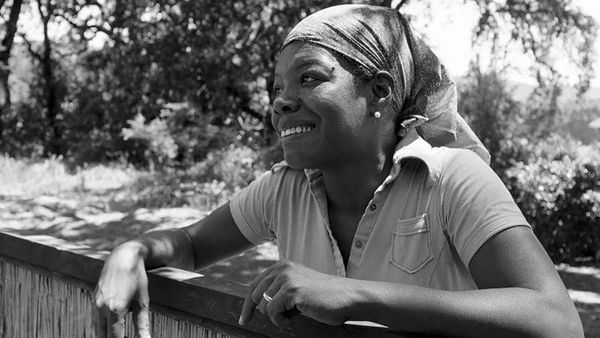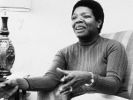Eye For Film >> Movies >> Maya Angelou And Still I Rise (2016) Film Review
Maya Angelou And Still I Rise
Reviewed by: Jennie Kermode

Maya Angelou was born into a world that barely valued her at all, but her death in 2014, at the age of 86, occasioned worldwide mourning. A poet, playwright, author, dancer, singer, actor, film director and political activist, she transcended everybody's expectations of what a poor black girl from St Louis could become. Bob Hercules and Rita Coburn Whack's in-depth documentary charts the full course of her life and includes extensive interview footage with the great woman herself.
Whilst it would be difficult to make a dull film about such a vibrant figure, it would be all too easy to fall short on informative detail or slide into hagiography. Thankfully this film does neither. Sticking to an ostensibly simple format, it uses Angelou's personal story to tell the story of a century of change. Extensive archive footage illustrates her encounters with Martin Luther King and Malcolm X; Bill and Hillary Clinton talk about the poem she wrote for his inauguration; Oprah Winfrey remembers her as a mentor and Common remembers her as somebody who taught him self respect. We see footage of civil rights marches she attended. Her son Guy - who has inherited her wit and delivers a number of laugh out loud anecdotes - recalls an incident when her courage in standing up to the police kept a demonstration from breaking up prematurely.

Notably absent are her various husbands and lovers, though she talks about them in passionate terms. Her sexuality comes across in its full fierceness, much more so than in previous tributes, and contributes to the sense of vitality that she embodies even in her eighties, in failing health. It also provides context for her feminism, which isn't talked about in depth but emerges through other aspects of her story, including the relationship with South African Vusumzi Make which had a pivotal impact on her sense of ethnic identity but ultimately failed because his cultural background had not prepared him for independent women. Angelou's independence of thought and action come through clearly in every aspect of the history recounted here, and there are contributions from several members of the strong friendship network that backed her up on the occasions when she needed it.
There is less focus on Angelou's poetry than some might have hoped for - but then that is, of course, easy to find elsewhere. She talks extensively about her love of reading and how it developed during the period of her childhood when she was mute. The extra barriers to accessing books caused by institutional racism might leave one wondering to what heights she could have ascended otherwise, but the impression given here is that it simply resulted n her forming a deeper relationship with the books she could get, prompting, unbidden, the type of deep analysis vital to developing as a serious writer. In parallel to this, we here about how traditional songs, which she had thought to humble to have power, bolstered her singing career in lieu of formal training.
With a life as rich as this it's inevitably difficult to cover everything, but Hercules and Whack indulge their audience with as much as it's likely to be able to take in. This is a film that will flourish in the home entertainment market where it's possible to return to it multiple times and appreciate its layers, as with Angelou's poems. The large amount of original interview footage, with the woman herself as insightful as ever, will delight her fans, and anybody unfamiliar with her work will find this a fascinating place to start.
Reviewed on: 22 Oct 2016














